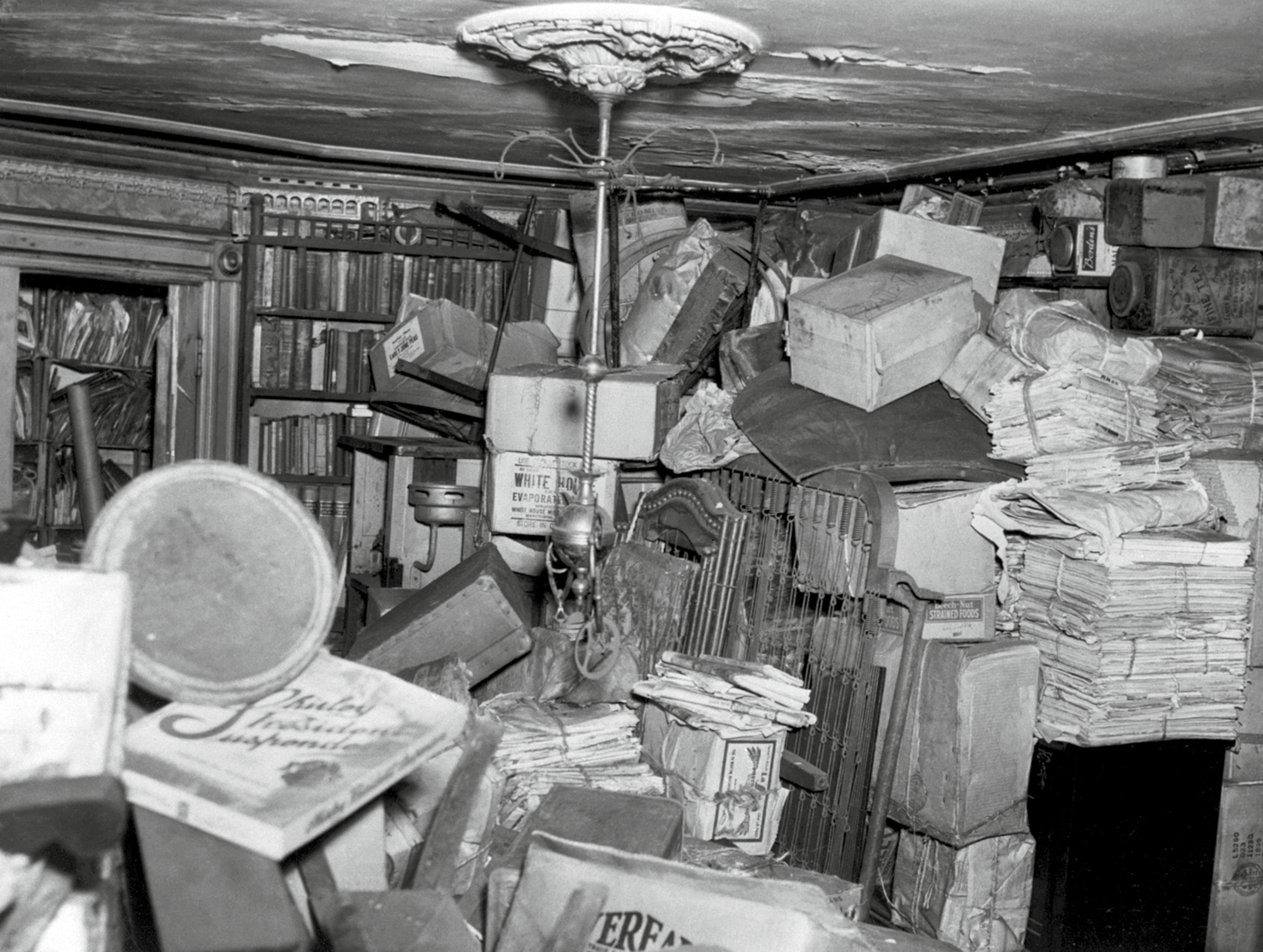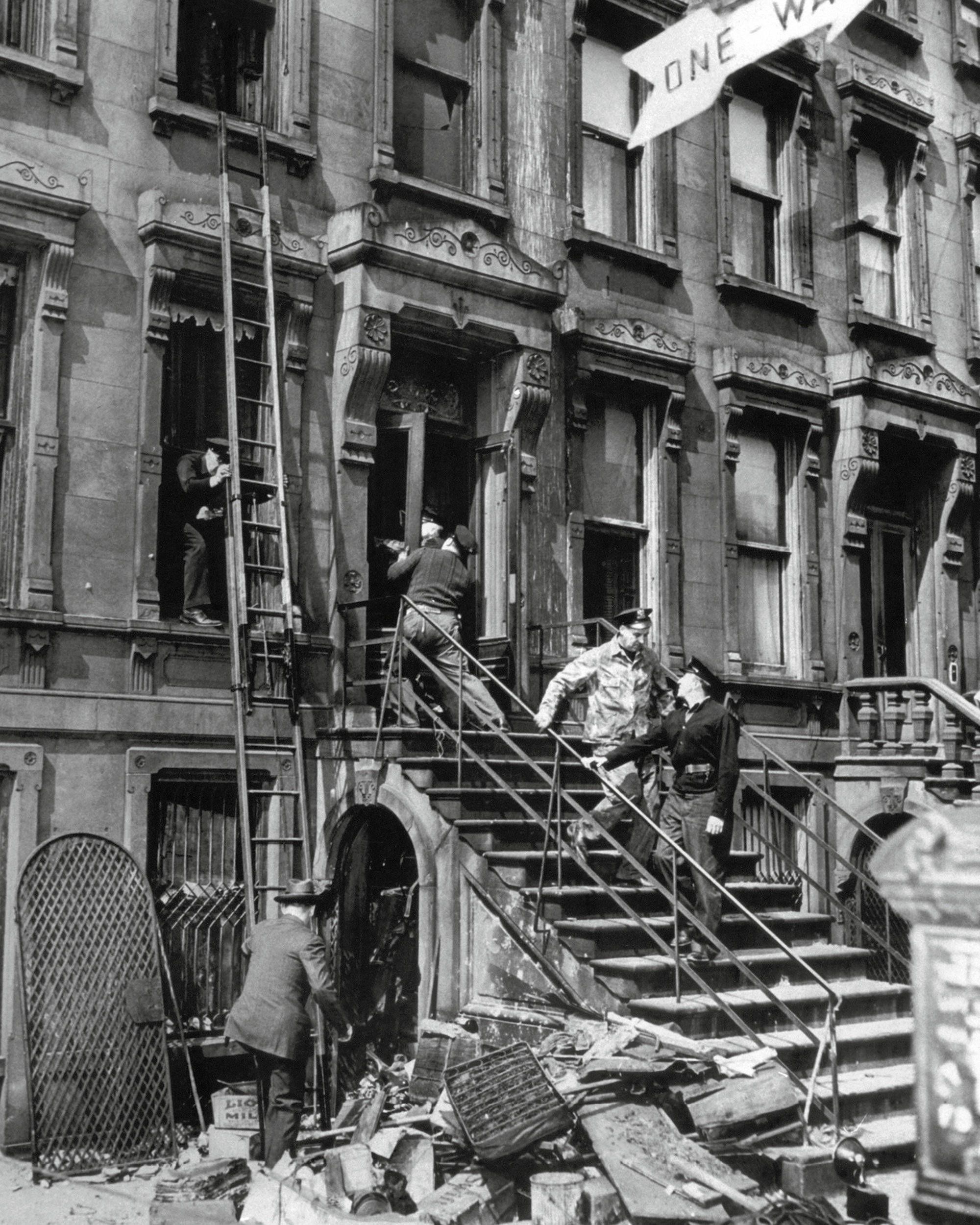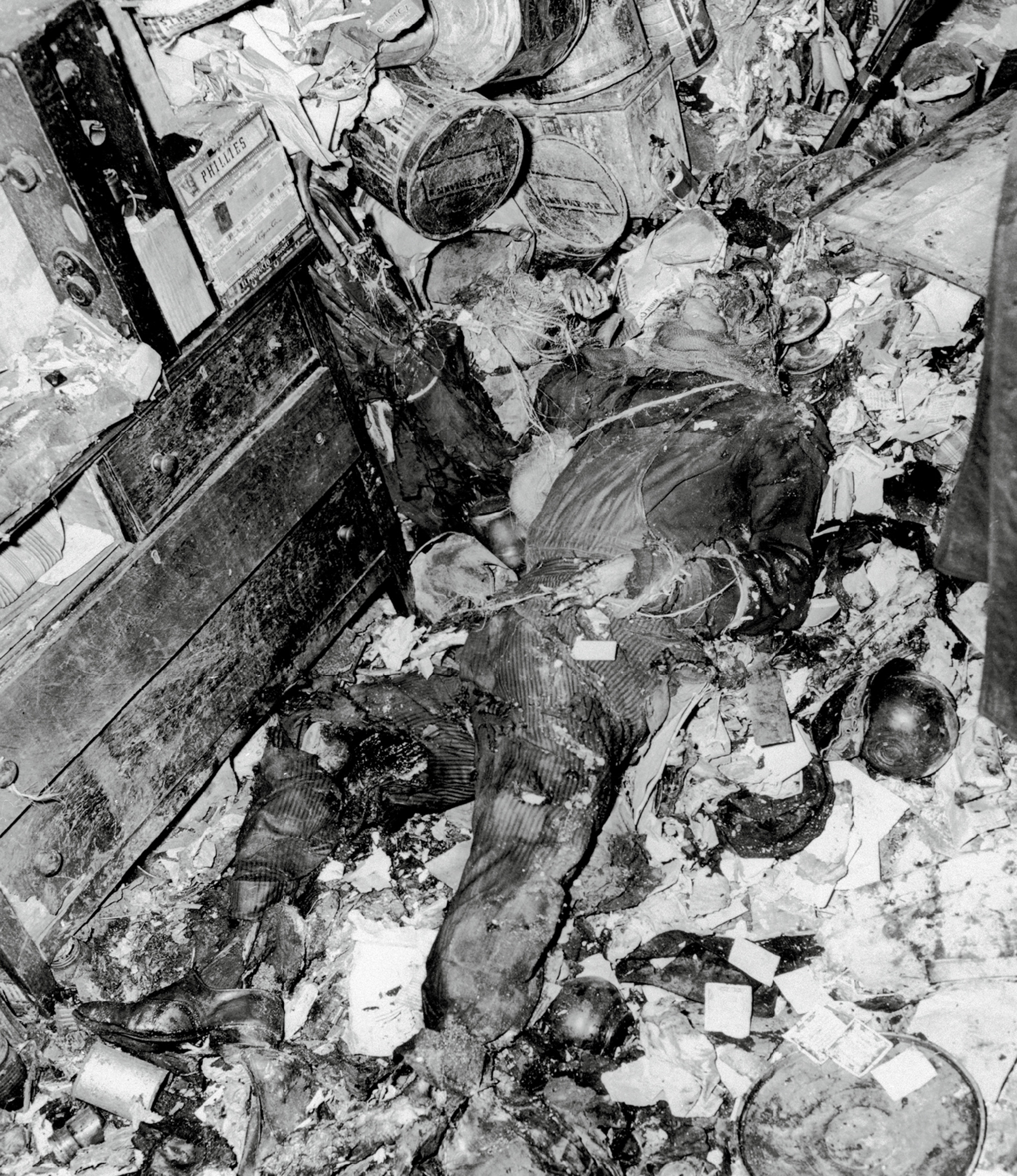Buried Alive
At home with the Collyer Brothers
Christopher Turner
On 21 March 1947, the New York Police Department received an anonymous phone call claiming that there was a dead body in Homer and Langley Collyer’s house on upper Fifth Avenue. They used an axe to smash in the front door of the derelict-looking Harlem brownstone, only to have a mountain of trash cascade on top of them. A patrolman climbed in through a second-floor window and, amid a houseful of stinking mess, found the sixty-five-year-old Homer slumped dead in an armchair, emaciated in a tattered blue and white bathrobe. In the search for his missing brother, the police emptied the house of a hundred and thirty tons of refuse, including a horse’s jawbone, an early X-ray machine, a doll carriage, twenty-five thousand books, the chassis of a Model T Ford, fourteen pianos, five dressmaker’s dummies, and several guns. It was three weeks before they discovered Langley, even though he was less than ten feet from where Homer had died. He had been crushed some time before in a landslide of newspaper bales and other rubbish, and his decomposing body had been gnawed raw by rats.

We are fascinated by mess and chaos, the psychotherapist Adam Phillips wrote in Promises, Promises, because of our “unconscious fantasies about what disorder might entail: something orgiastic, something violent, something inchoate, something longed for and feared.” The story of the Collyer brothers, after whom compulsive hoarding syndrome is named, has inspired over a dozen novels and plays, almost as if their anarchic clutter invited writers to sort and make meaning. The most famous of these fictions is Marcia Davenport’s 1954 bestseller, His Brother’s Keeper, which explained the Collyer brothers’ decline into hermetic squalor as the result of their lives being destroyed by two women.
More than half a century later, novelist E. L. Doctorow picks up the story again in Homer & Langley, billed as a “free imaginative rendering” of the brothers’ lives. Doctorow has reversed the order of the brothers’ ages and he makes the blind Homer—who narrates the plot—the faded pianist, rather than his long-haired younger brother who was in fact the promising musician. In the novel, the eccentric duo, though shut into their private world, don’t live the completely reclusive life we know they did; indeed, they seem to welcome the world into their disorderly home, thereby holding up a murky mirror to history: a jazz trumpeter from the Harlem Renaissance, a Japanese couple who are interned after Pearl Harbor, and a flock of hippies all pass through their doors. Doctorow extends the brothers’ lives three decades so that they can usher in the Age of Aquarius.
Soon after the Collyer brothers’ death, the New York Times wrote: “There is, admittedly, something unattractive about the avidity with which society now pores over every detail the Collyer brothers vigorously withheld from public scrutiny. … It is almost as though society were taking revenge upon the brothers for daring to cut the threads that bind man to his fellows.” In 1928, through sheer miserliness, the brothers—by cutting off their phone, gas, water, and electricity—took themselves off the grid. (Langley tried to hook up their father’s old Model T Ford to a generator, but it didn’t work and they made do with a kerosene stove and lamp.) It is because they severed these ties with the bourgeois world that they become gurus to the counter-culture in Homer & Langley. Doctorow chooses to give the Collyer brothers’ sorry lives meaning by making them emblems of what the philosopher Herbert Marcuse called “the great refusal”: the strategy of non-participation with which Marcuse hoped that 1960s radicals would take a stand against the conformism of Nixon’s “silent majority.”
• • •
The New York Public Library has a small archive of 1930s and 1940s press cuttings that tell the piecemeal story of the Collyer brothers’ existence. Their guarded isolation was first intruded upon in 1938 when the World-Telegram reported a story about a property developer who wanted to buy a piece of land that they owned on the Queens waterfront. After his letters and personal calls went unanswered, he staked out their home in the hope of an opportunity of persuading them to sell. The journalist who accompanied him repeated the local myth that the reclusive brothers lived in “Orientalist splendor” with “carpetbags of money” secreted in their brownstone mansion. “The mystery men of Harlem,” as the journalist called the patrician eccentrics, subsequently became unwitting city curiosities.
The Collyers were scions of a long-established New York family, whose ancestors came over on the Speedwell, a second Mayflower. Their grandfather was one of America’s preeminent shipbuilders and their father an eminent gynecologist. When asked by the World-Telegram if it was true that he kept a rowboat in the attic and a Model T in the basement, Langley explained that his father would carry a small canoe to the Harlem River on his head and paddle to work at the City Hospital on Blackwell’s Island and added that “the auto was his too.” Both brothers were well-educated and attended Columbia University, where Homer studied admiralty law and Langley engineering.
Langley gave up his concert career after a performance at Carnegie Hall (“Paderewski followed me,” he said, “He got better notices than I. What was the use of going on?”), preferring to tinker with his inventions, which included a vacuum designed to clean the inside of pianos. Homer worked in a law firm until he suffered a stroke in 1933 and went blind. He refused to visit a doctor, for fear that he would have his optic nerves excised and, crippled with inflammatory rheumatism, after 1940 he never went out again. Langley prescribed him a diet of oranges: “Sometimes he eats 100 a week,” he told a journalist for the New York Times. “They will cure his blindness. Remember, we are the sons of a doctor.”
As Homer’s world shuttered closed, so did his brother’s. Worried about leaving him alone, Langley began to go out only after midnight to collect water from a drinking post four blocks away and to scavenge for food and other junk—neighbors called him the “ghosty man.” Along with everything else, he began to hoard papers, explaining to the New York Herald Tribune: “I’m saving newspapers for Homer so that when he regains his sight he can catch up on the news.”

In November 1942, when they defaulted on their mortgage, the Collyers’ bank started eviction proceedings and the brothers found themselves once again in the newspapers Langley obsessively collected. Just as the police were forcing entry into their house, Langley appeared with a check for $6,700, a huge sum at the time, which paid off their loan in full and fueled the rumors that the brothers lived in palatial grandeur behind the shabby facade: “Just tommyrot,” Langley said in response. However, he did nothing to help dispel the myth that made them a magnet to burglars. “I can’t ask anyone inside,” he said. “There are boxes all around to keep out thieves and my brother is not well enough to receive guests.”
In July 1946, Langley was subpoenaed and forced to appear in court to testify against a young man charged with breaking into the house next door. The last photographs taken of Langley show him as a dissolute Baudelaire with a celluloid collar, long moustache, and floppy bow tie, his black suit held together with rusty pins (he carried a bundle of newspapers that he’d collected on the subway ride to the court). His attorney described him as “a gentleman of the 1880s” and he exuded, wrote one journalist, “an air of old world elegance, even though somewhat frayed.”
• • •
In a way, rather than having the liberal, “judicious approach to ethnicity” that Homer claims to possess in Doctorow’s novel, the snobbish Collyer brothers were symptomatic of the prejudice and paranoia that marked Harlem’s history in the twentieth century. In the thirty-eight years that they lived there, Harlem changed completely as the racial lines of the city were redrawn, leaving the Collyer brothers feeling besieged and trapped in a mainly black neighborhood and stubbornly defending an Alamo that they barricaded and booby-trapped with junk.
In 1909, the Collyers had moved from well-to-do Murray Hill to Harlem, designed as a new suburb for wealthy residents, complete with a polo field and opera house. However, the area wasn’t to be the fashionable center that developers had hoped for. The new subways that would have connected Harlem to the rest of the city were delayed, and the stranded, empty properties were leased instead to Eastern European Jews and African Americans who, despite the resistance of many landowners, moved into the area in large numbers. By 1919, Dr. Collyer, along with most of Harlem’s other upper-class residents, had moved to a more salubrious area of Manhattan: Homer and Langley, now both well into their thirties, stayed behind in the family home.
In 1920, Harlem was 32% black; by 1950, with an influx of African Americans from the South, this figure reached 98.2%. “We used to pass by their house all the time on the way to school,” the writer James Baldwin remembered of the Collyer brothers. “Even then they were very strange since they were just about the only whites left in the neighborhood.”
Baldwin, born in Harlem in 1924, moved to Greenwich Village when he was eighteen. In his first article, “The Harlem Ghetto,” published in Commentary the year after the Collyer brothers died, Baldwin remembered without nostalgia the area’s damaged buildings, vandalized projects, and crowded, dirty streets. Because blacks weren’t free to live where they pleased in the city, landlords were able to charge them twice as much rent as in white slums and almost every family had to take in lodgers to meet the bills. “All of Harlem is pervaded by a sense of congestion,” Baldwin wrote, “rather like the insistent, maddening, claustrophobic pounding in the skull that comes from trying to breathe in a very small room with the windows shut.”
In his essay, “Harlem is Nowhere,” published the same year as Baldwin’s piece, Ralph Ellison—author of The Invisible Man—expressed a similarly stark view of Harlem:
To live in Harlem is to dwell in the very bowels of the city, it is to pass a labyrinthine existence among streets that explode monotonously skyward with the spires and crosses of churches and clutter underfoot with garbage and decay. Harlem is a ruin; many of its ordinary aspects (its crime, casual violence, crumbling buildings with littered areaways, ill-smelling halls and vermin-invaded rooms) are indistinguishable from the distorted images that appear in dreams, and which like muggers haunting a lonely hall, quiver in the waking mind with hidden and threatening significance.In a way then, in their rag-and-bone eccentricity, the Collyer brothers reflected as well as reacted to the slum they lived in. They too were invisible men who inhabited Ellison’s world of nightmarish fears. Harlem’s city inside the city was, of course, as Ellison would later put it, also “the site and symbol of Afro-American progress and hope … a place of Left Bank excitement.” But the anachronistic Collyers were never a part of that vibrant scene; they were relics of Harlem’s aristocratic past who had clung on, like the Beales in Grey Gardens.
The brothers lived through the Harlem race riots of 1935 and 1943, both of which saw hundreds of businesses destroyed and looted, and exacerbated their fear of thieves. “Rowdies,” as Langley called them, threw bottles and rocks at the house breaking all the windows, which he didn’t bother to replace, and they were burgled three times. “I have to dress this way,” Langley once explained of his shabby attire. “They would rob me if I didn’t.” Police patrolled the neighborhood like it was occupied territory.

When Langley failed to turn up to his brother’s funeral, the Daily News offered a $1,500 reward for information on his whereabouts. Phony tips set the police off on wild goose chases all across the country and large crowds gathered outside the Collyer home to watch detritus being thrown from the windows, hoping for a glimpse of the missing legend: “Few lingered,” reported the Daily News, “they were driven away by the smells.” Langley was found nineteen days after his brother. He had an onion sack tied around his neck and was wearing four pairs of trousers, three jackets, and a red flannel bathrobe to protect against the March cold. He’d tripped over one of his booby-traps and suffocated under the weight of his strategically placed hoardings. His brother, paralyzed and cut off, starved to death a week later.
The Collyer brothers’ estate was valued at $66,000, which was consumed by estate and unpaid property taxes. The open windows and leaking roof of their once elegant home had caused the beams to rot, and the walls and ceilings were caving in; six months after they died, the building was condemned and pulled down. In 1965, as part of a strategy to ease the urban pressure that had exploded in a five-day riot the year before, trees were planted in the scar left by the demolition. Apart from their literary legacy, this tiny, rubbish-free space—Collyer Brothers Park—is all that remains.
Christopher Turner is an editor of Cabinet. His book, Adventures in the Orgasmatron: How the Sexual Revolution Came To America, is forthcoming from Farrar, Straus and Giroux.